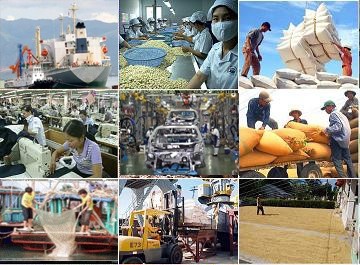(VOVworld) - International organizations such as the Asia Development Bank (ADB, the World Bank (WB), and the International Monetary Fund (IMF) have adjusted Vietnam’s economic growth target to 5%, which is lower than their estimate 4 months ago. Many economists say this growth rate is appropriate now because Vietnam is focusing now on stabilizing the macro-economy to prepare for future growth.

Vietnam’s economic growth rate is predicted to recover next year
|
Although Vietnam’s economic growth rate is lower this year, it is expected to improve next year. The organizations said that by curbing inflation, the Vietnamese government is on the right track to stimulate growth. One visible example is the loosening fiscal policy. Vietnam has expectedly decreased the interest rate, from 15% last year to 11% by the middle of this year. In addition to firm action to reduce bad debt, the government will continue to bolster weak banks next year to strengthen the banking system. The government is considering establishing a debt buying company that belongs to the State Bank and has total capital of 5 billion USD. Vietnam has accelerated economic restructuring, focusing on public investment. Minister of Planning and Investment Bui Quang Vinh elaborates: "According to the Party Central Committee’s resolution, the core of investment restructuring is public investment. The State allows private investment in more areas. It will reduce investment from its budget and government bonds and mobilize non-state investment resources. The State will increase support for the public-private partnership model."
Deferring value added tax has proven a positive step toward easing the difficulties of domestic businesses and boosting exports. An ADB report indicates that, with China, Vietnam is one of two Asia-Pacific nations that have not experienced export declines. Other countries in the region have suffered serious declines. Another useful measure has been creating incentives to attract foreign investment. The Foreign Investment Department of the Ministry of Planning and Investment says FDI to Vietnam toped 1 billion USD last month. Since the beginning of the year, FDI has totaled 9.52 billion USD, of which 8 billion has been disbursed. Nguyen Van Toan, Vice Chairman of the Vietnam Association of Foreign-Invested Enterprises, told VOV: “FDI registered since the beginning of this year is lower than last year, but disbursed capital has been about 98%. Investment in technology and production is rather high. Previously, no enterprise had invested more than 1 billion USD in Vietnam, but this year two Japanese companies have done it, including a real estate company. This shows a long-term expectation of a profitable market in the future."
Experts say that although Vietnam is not totally integrated into the world, it has been influenced to a certain extent by the global economic recession. Vietnam must improve its ability to forecast the macro economy to improve the government’s management. Vietnam has agreed to participate in a financial evaluation program conducted by the IMF and WB, which is scheduled to be completed by the first quarter of next year. The evaluation outcomes and Vietnam’s commitment to reforms will help reassure investors.
Despite current difficulties, economists predict that Vietnam’s economic growth rate will recover, given positive signals such as higher labor productivity, increasing GDP per capita, export advantages, and the administration’s determination to stabilize the macro-economy.